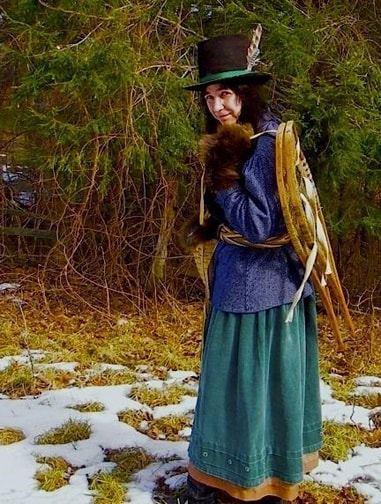Walk with the Indian Doctress: Restorative Approaches to Interpreting Native American Medicine
A Zoom Presentation by Dr. Margaret M. Bruchac
Associate Professor of Anthropology, Associate Faculty in Cultural Heritage, and Coordinator of Native American and Indigenous Studies at the University of Pennsylvania
Thursday, May 12, 2022 at 7 pm
|
Margaret Bruchac as Indian Doctress
Photo by Justin Kennick. |
Dr. Margaret Bruchac will describe the lives and work of several 19th century Indigenous healers, including Rhoda Rhoades (1751-1841), who treated people in Northampton and other western Massachusetts locales.
Rhoades doctored people at her home in “Indian Hollow,” a section of Huntington later destroyed by the construction of the Knightville Dam. She cured illnesses using special diets and traditional medicines made with boneset, Joe Pye weed, wake robin, and other indigenous plants. Rhoades' neighbors recalled that she grew “every kind of flower imaginable” and used them to make an herbal medicine called "The Extract." Dr. Bruchac will discuss her research on these gifted Native healers, revealing how their knowledges were exploited by patent medicine peddlars and Yankee physicians. She will also discuss her approach to restorative research, including living history performances in the character of “Molly Geet, the Indian Doctress” at Old Sturbridge Village museum. Register for the Zoom link Sliding scale admission $5-25 |
Dr. Margaret Bruchac is an Associate Professor of Anthropology, Associate Faculty in Cultural Heritage, and Coordinator of Native American and Indigenous Studies at the University of Pennsylvania. She has long been a living history performer and consultant on Native American interpretation for historical museums, including Historic Northampton.
RESEARCH BLOG: On the Wampum Trail
https://wampumtrail.wordpress.com/
RECENT BOOK: Savage Kin: Indigenous Informants and American Anthropologists
https://uapress.arizona.edu/book/savage-kin
Margaret Bruchac's Land Acknowledgement:
This land acknowledgement references the Indigenous peoples on whose traditional territories my academic and personal homes are situated: the Lenape of Lenapehoking (including Philadelphia, Pennsylvania), and the Nonotuck of the Kwinitekw valley (including Northampton, Massachusetts), and their Indigenous kin and neighbors. I acknowledge the continued presence and resilience and sovereignty of Indigenous communities and nations today, and thank the Indigenous people I work with - particularly my Algonkian and Haudenosaunee colleagues - for their good will in our on-going efforts to collaborate in the challenge of decolonizing, recovering, and restoring Indigenous histories, lives, and futures.
https://wampumtrail.wordpress.com/
RECENT BOOK: Savage Kin: Indigenous Informants and American Anthropologists
https://uapress.arizona.edu/book/savage-kin
Margaret Bruchac's Land Acknowledgement:
This land acknowledgement references the Indigenous peoples on whose traditional territories my academic and personal homes are situated: the Lenape of Lenapehoking (including Philadelphia, Pennsylvania), and the Nonotuck of the Kwinitekw valley (including Northampton, Massachusetts), and their Indigenous kin and neighbors. I acknowledge the continued presence and resilience and sovereignty of Indigenous communities and nations today, and thank the Indigenous people I work with - particularly my Algonkian and Haudenosaunee colleagues - for their good will in our on-going efforts to collaborate in the challenge of decolonizing, recovering, and restoring Indigenous histories, lives, and futures.
